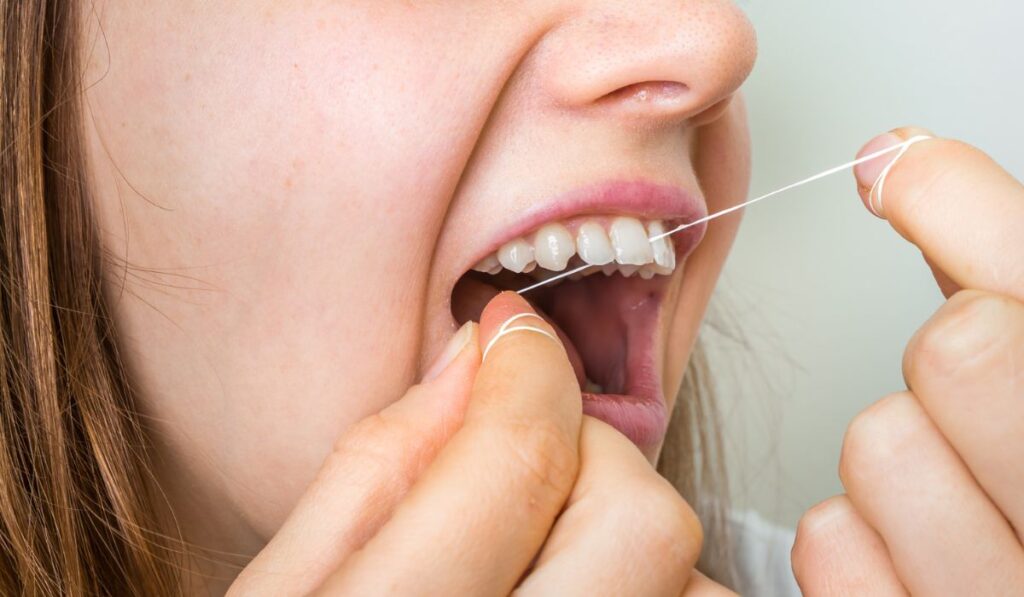Have you ever noticed that brushing doesn’t always clean your teeth thoroughly? That’s because brushing your teeth simply isn’t enough. You need to floss daily in order to maintain proper dental hygiene.
Flossing removes food particles and plaque from all areas of the mouth. It also strengthens your gums, minimizes the risk of cavities, and prevents bad breath. Dentists recommend flossing daily, especially if you’ve previously neglected this area of oral hygiene.
Let’s explore the benefits of flossing as well as the consequences of not flossing daily. We’ll also look at how skipping flossing can affect your overall well-being, and what to do if you’ve never flossed before.
What Are the Benefits of Flossing Your Teeth?

There are many advantages to flossing your teeth. Flossing daily removes plaque and food particles from areas where toothbrushes can’t reach. Moreover, flossing keeps your gums healthy, minimizes the risk of cavities, and prevents bad breath.
Here are some of the main benefits of flossing:
Removes Plaque and Food Particles
As we mentioned, the primary benefit of flossing after eating is that it removes plaque and food particles that get stuck between your teeth.
Foods rich in sugars and carbohydrates can get stuck between your teeth and result in the formation of plaque.
Plaque is a yellowish bacterial substance that can damage your teeth and gums. While brushing will remove plaque from the tooth surface, flossing helps clean the hard-to-reach areas, resulting in better dental hygiene.
So, if you’re a person who cares about dental hygiene (and everyone should!), flossing is among the best ways to take care of your teeth.
Keeps Gums Healthy
People with sensitive gums often believe that flossing can damage their gums and cause excessive bleeding. But the truth is that flossing helps make gums healthier. Flossing helps prevent gum diseases like gingivitis.
It also reduces the risk of swelling and redness of gums since bacteria cause gum infections in plaque.
So, be smart and make your sensitive gums stronger by flossing regularly. Healthy gums prevent your teeth from falling out and save you the cost of a root canal!
Minimizes the Risk of Cavities
A significant benefit of flossing is that it minimizes the risk of cavities, which is among the most common oral hygienic problems. Cavities can lead to significant tooth decay, which may result in toothaches or nerve damage in severe cases.
Flossing is a low-cost, easily available method to keep your teeth healthy, so if you don’t want to incur expensive trips to the dentist, or deal with a painful toothache, floss at least once a day.
Prevents Bad Breath
Have you ever brushed your teeth only to find that you still had bad breath after a few minutes? The problem may be due to foul-smelling bacteria that don’t go away with brushing.
The solution? Floss before brushing to remove this bacteria.
Flossing also removes food particles, prevents bleeding gums, and reduces the risks of tooth diseases. This, in turn, helps you avoid bad breath and tooth discoloration, so that you can be confident in your smile.
If you want whiter teeth and fresher breath, add a few minutes of flossing to your daily oral hygiene routine.
A Healthy Mouth Leads to a Healthy Body
Dental hygiene is crucial not just for a healthy mouth but for a healthy body as well. An unhygienic mouth can even result in heart disease because bacteria from mouth infections can travel to your bloodstream, causing severe health issues.
When you floss daily, it removes this bacteria, which will reduce the risk of heart disease, breathing problems, and other health problems.
So, the next time you procrastinate while taking care of your teeth, consider that it may save you from a fatal heart attack!
What Happens if You Don’t Floss?
While dentists recommend that you develop a habit of flossing daily, studies have shown that most adults don’t floss regularly. Unfortunately, skipping over flossing has its disadvantages.
Here are some downsides of not flossing regularly:
You’re More Likely to Develop Gum Diseases
If you don’t floss daily, it increases the risk of gum diseases such as gingivitis, which causes redness, swelling, and bleeding of the gums. Another gum problem that can develop as a consequence of not flossing is gum recession.
Gum recession results in the gum wearing away, exposing your teeth roots. If not treated, this may cause severe cavities, and your teeth can even fall out.
The treatment of tooth diseases such as cavities or root canals is also very expensive. So, not flossing daily can also damage your finances as well!
You’ll Get Bad Breath and Yellow Teeth
If you don’t floss, food particles stuck between your teeth result in plaque formation. An embarrassing consequence of this issue is yellowish teeth and bad breath.
While skipping your flossing routine for a day or two won’t give you yellow teeth, not flossing at all certainly might.
You May Develop Health Problems
You also risk your bodily health by skipping flossing. Infectious pus or bacteria can travel to your bloodstream, increasing the risk of heart problems and respiratory diseases.
Many other health issues, such as dementia, ulcers, constipation, diabetes, kidney diseases, and pregnancy complications, are connected to bad oral health.
So, to take care of your health and prevent unnecessary complications, think twice before skipping flossing!
Is It Good to Floss Everyday?

Yes, flossing daily is a habit you must develop to stay healthy. Experts say that flossing daily keeps your mouth and body healthy. It also saves you the trouble of spending a ton on expensive dental treatments.
But some people worry that flossing may damage their gums. This isn’t the case. Flossing helps strengthen your gums, even if your gums are sensitive.
However, flossing too rigorously or several times a day can damage your gums, so don’t overdo it.
It’s better to be safe than sorry! Don’t think of flossing as a hectic task; it’s actually quite easy once you develop a habit of it.
Is It Too Late to Start Flossing?
The good news is that it’s never too late to start a good habit. If you haven’t developed the habit of flossing or your teeth are already yellow, starting anew may prevent further damage to your teeth and gums.
Flossing for a couple of minutes with a high quality floss (on Amazon), especially after eating, is more than enough. Keep in mind that if you don’t have a habit of flossing, your gums might bleed for the first couple of tries.
But there’s no need to worry. When you floss daily, you’ll soon get whiter teeth and healthier gums. Best of all, you’ll no longer have to walk around with bad breath!


